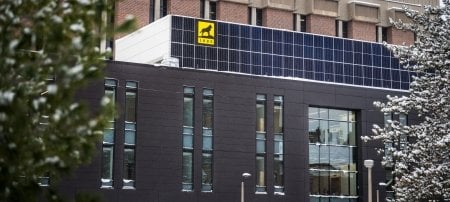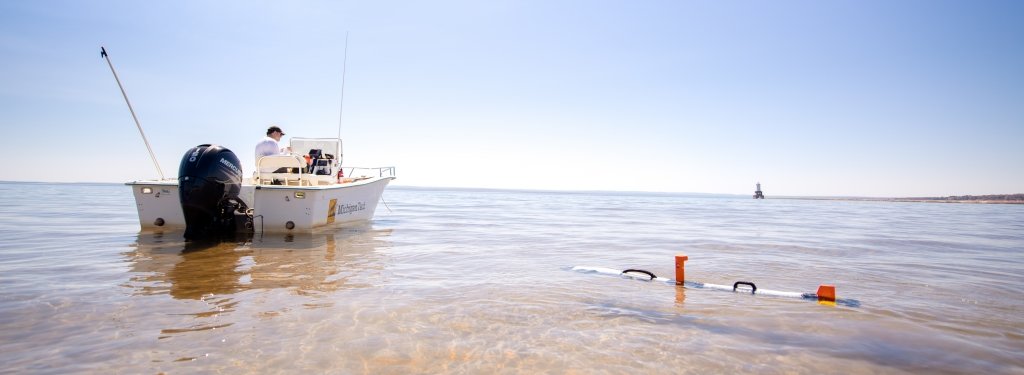Michigan Tech's thought leaders glimpse into the University's future. Nina Mahmoudian, Lou and Herbert Wacker associate professor in mobile systems of mechanical engineering, reflects on where the field is heading over the next decade.
Q: What is happening today that will change mechanical engineering education and research 10 years from now?
The pieces that make an intelligent system are becoming more accessible and affordable. These components are going to change the face of education and research, especially in robotics. Users are getting younger and getting more hands-on learning opportunities—they’re watching YouTube videos, reading articles, taking online courses. They’re doing a lot of self-learning and teaching themselves programming on their own; kids often come to us with more background because they’re interested. It’s a new way of learning and there are so many opportunities, so we need to take it seriously.
Q: What research being conducted in the Department of Mechanical Engineering–Engineering Mechanics today will shape the world 10 years from now?
I’m partial to robotics and autonomy; they’re going to play a large role in society. For example, autonomous cars and package delivery are obvious, and are already happening. What will be significant is how robotics and autonomy will be used for service and fill in the gaps in social systems. We are going to see robots help with therapy and education for kids with special needs or to care and assist the elderly. The future lies in the collaboration of robots and humans and understanding the ethics of those interactions. It’s about trust.

Q: What do you hope the 2027-28 academic year will look like for women in STEM?
More women in all levels, but specifically in key roles and in decision-making positions. I would like to see a conscious decision to engage girls early with science, technology, engineering and math (STEM) and tell them the fact that STEM provides us tools to impact society and help people. And it’s fun! If we can attract the attention of middle schoolers now, then we can hope to see more presence down the road. To do so, they need to see more female faces in leadership now.
Q: What do you expect graduate study in engineering to entail in 2027-28?
The transition to application will be key in graduate studies. Right now, we teach theory and simulation with some hands-on work; our students are good at problem-solving, the underlying math and high-level controls. But there’s a big gap between academic development and real-world applications. We will create more opportunities in graduate research to combine fundamentals research to facilitate a seamless transition into applications.
Q: What are the exciting changes in education taking place in your field currently that will have a major impact down the road?
Project-based education is up-and-coming. We’ve had lab work and projects in the past, though they have been highly structured throughout a semester. What’s new is that we make room for unstructured learning that motivates self-learning and life-long curiosity that helps students be more agile problem-solvers in real life. In addition to technical skills, they need to develop time management and teamwork to overcome challenges to deliver the project on time. Small achievements are pieces that complete the puzzle.
Q: How should Michigan Tech position itself to be a leader in robotics and autonomous vehicles?
It’s simple: we need to grow in numbers and work together. Hire more faculty, invest in their careers, engage with more industry partners. We also need to cultivate collaboration on campus as well as nationally and internationally. I say simple, but I’m aware it takes time and effort.
Q: How are we currently positioned? Are there any changes or transitions the University
should undertake?
We are in a position of growth with robotics—and we can accelerate that growth. We need to assess our strengths, know our weaknesses and then build collaborations.
We do some interdisciplinary work already and there are more opportunities to pull in versatile faculty expertise. For mobile systems and autonomous vehicles, we need to take advantage of our unique location and invest in shared infrastructure. Building research communities on our combined strengths in expertise and infrastructure will help us overcome longstanding scientific and technical challenges that are currently barriers to exciting discoveries. We share knowledge and are invested in the outcomes.
Michigan Technological University is an R1 public research university founded in 1885 in Houghton, and is home to nearly 7,500 students from more than 60 countries around the world. Consistently ranked among the best universities in the country for return on investment, Michigan's flagship technological university offers more than 185 undergraduate and graduate degree programs in science and technology, engineering, computing, forestry, business, health professions, humanities, mathematics, social sciences, and the arts. The rural campus is situated just miles from Lake Superior in Michigan's Upper Peninsula, offering year-round opportunities for outdoor adventure.






Comments